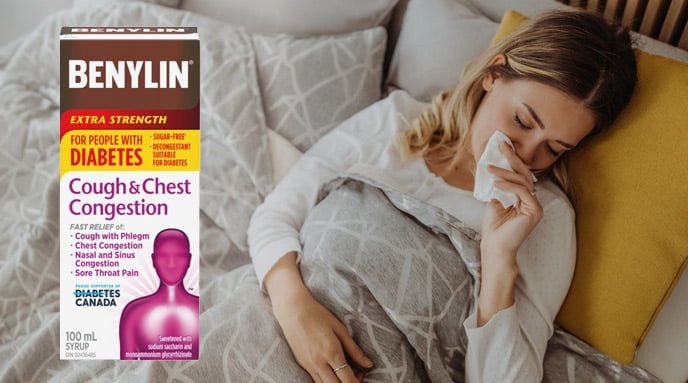Treating a cold is tough for everyone. But when you have diabetes, your recovery may be riskier and harder to handle. This is because diabetes lowers your immunity, and any illness or infection may raise your blood sugar levels, making everyday treatments more complicated1.
It is important to stay vigilant and monitor your insulin levels to ensure you take the proper precautions in a timely manner. While treating a cold with diabetes can be tricky, there are steps you can take to ensure your body stays healthy. Read on to learn some helpful tips on managing your diabetes while you are sick, and how to choose the right remedy that can work for you during the cold and flu season.
1. MONITOR BLOOD SUGAR LEVELS
Whether you have Type 1 or 2 Diabetes, high blood sugar levels can lead to life-threatening problems such as diabetic coma, or ketoacidosis – a buildup of excess acid in your blood when your blood sugar is too high for a prolonged period2.
But an increase in sugar level does not only occur after you eat or exercise. When your body is battling a cold or any illness, it sends out stress hormones to fight the infection. This causes your liver to release more glucose into the bloodstream, causing a spike in your body’s sugar level. For people who do not have diabetes, their body naturally counters this by producing insulin to regulate blood sugar levels3.
In contrast, if you have diabetes (Type 1 or 2), your blood sugar levels stay high as your body either does not or may not produce enough insulin. It is recommended to check your blood sugar level every 3 or 4 hours if you are sick with a cold and adjust your insulin intake accordingly2.
2. REMEMBER TO EAT AND DRINK
You may not feel hungry when you are sick, but it is important to keep up with a regular meal plan. Letting your blood sugar levels fall too low can also be dangerous. If you are unable to eat your regular meals, try to consume soft foods that contain carbohydrates. These include frozen yogurt, a juice box, or soup.
Being sick with a cold or the flu also means you are losing more fluids than normal. Try to drink plenty of water in addition to other fluids to keep yourself hydrated. Drinking water or sugar-free liquids can also help flush high blood sugar or ketones from your system2.
3. COLD MEDICINES FOR PEOPLE WITH DIABETES
Not all over-the-counter (OTC) medicines are suitable as they can affect your blood sugar levels. Generally, it is advised to avoid medicines that are high in sugar.
BENYLIN® Extra Strength Cough & Congestion Syrup for People With Diabetes is a sugar-free syrup that contains a decongestant suitable for diabetics. Recognized by the Canadian Diabetes Association, this sugar-free§, sorbitol-free product is specially formulated with menthol to provide effective cough, congestion and mucus relief expected from BENYLIN® products.
It is always recommended to follow the instructions on the label and consult your health care professional to ensure the product is suitable for you.
§Sweetened with sodium saccharin.
4. REDUCING YOUR RISK OF A COLD
Did you know that there’s no cure for the common cold? But there are steps you can take to reduce your risk of cold. Remember to wash your hands with soap regularly and avoid being around people who are feeling unwell. As having diabetes increases your risk for developing complications of the flu (such as pneumonia), it is important to take preventative measures so you and your loved ones can stay healthy. Consult your doctor about getting a flu shot every year and remember to go for regular health check-ups2.
Remember, you can avoid falling sick by simply managing your daily routine. Ensuring that you get enough sleep at night, exercising regularly, and finding healthy ways to manage stress are all great ways to keep your mind and body healthy.

